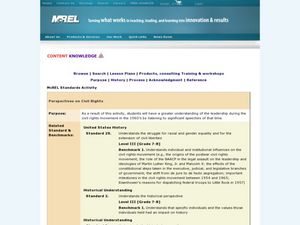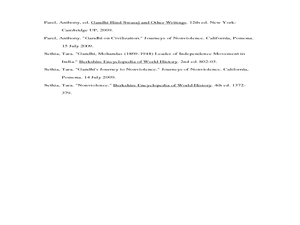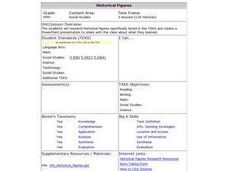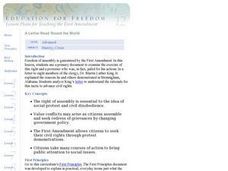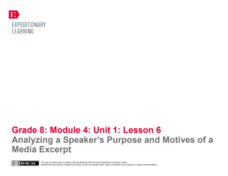Curated OER
Martin Luther King Jr. Who Is He?
Young scholars describe MLk's leadership of the desegregation movement. Students discuss the meaning of non-violent revolution. Young scholars identify the difference between their lives and those ofcitizens in 1963. Students write a...
Humanities Texas
Primary Source Worksheet: Lyndon B. Johnson, Excerpt from “To Fulfill These Rights”
"Equal opportunity . . . is not enough." Johnson's 1965 commencement address to the students at Howard University provides an opportunity for participants to see how education was a key element in his vision for civil rights.
Curated OER
Committing to Nonviolence: A Lesson from Viva La Causa
Students examine the social change movements of the American 20th century. In this nonviolence lesson, students research the work of Mahatma Gandhi, Martin Luther King, Jr., and Caesar Chavez. Students compare and contrast the social...
Curated OER
Perspectives on Civil Rights
Middle schoolers examine speeches of the Civil Rights Era. In this American history lesson, students listen to speeches delivered by Martin Luther King, Jr. and John F. Kennedy. Middle schoolers respond to guiding questions as they...
Curated OER
Caring and Self-Interest
Students write in their journal. In this philanthropy instructional activity, students review the definition of philanthropy and read a quote by Dr. Martin Luther King, Jr. Students respond to the question "What are you doing for...
Curated OER
Anti-Vietnam War Movement Lesson
Students examine reasons why many Americans opposed the Vietnam War. In this world history lesson, students view a Powerpoint of anti-war images and a timeline of events that led to the war. Students examine speeches made by John Kerry...
Curated OER
Nonviolence and Conflict: Its Importance to Building Community
Students study nonviolence and the values associated with nonviolence. In this social science lesson, students identify the six steps of nonviolence and the six principles of nonviolence as put forth by Martin Luther King, Jr. Students...
Curated OER
Civil Rights: An Investigation
High schoolers take a closer look at the political side of the American Civil Rights Movement. For this 20th century American history lesson, students research the contributions of President Johnson, Dr. Martin Luther King, Jr., and J....
Curated OER
Technology: Historic Figures
Fifth graders research historical figures and create Powerpoint presentations about them. They present their completed projects to the class. Students gfenerate one question about their figure which is included on a quiz.
Curated OER
A Letter Read 'Round the World
Young scholars examine primary document to examine the concept of free assembly, and analyze Dr. Martin Luther King Jr's letter to the clergy to explain the rationale for this tactic to advance civil rights.
Curated OER
Youth Participation in Nonviolence
Students explore the use of nonviolent resistance. In this social justice lesson, students listen to their instructor present a lecture on Mohandas Gandhi and Martin Luther King, Jr. as well as the Apartheid Movement in South Africa.
National Endowment for the Humanities
"Sí, se puede!": Chávez, Huerta, and the UFW
"Sí, se puede!" Cesar Chavez and Dolores Huerta believed organizing farm workers and changing their working conditions were possible. Scholars examine provisions of the Bracero Program, videos, and the United Farm Workers' (UFW) work....
Scholastic
Ruby Bridges: A Simple Act of Courage, Grades K-2
A civil rights movement lesson plan designed specifically with the Common Core State Standards in mind, young learners are introduced to the story of Ruby Bridges as the first African American child to attend an all-white elementary...
Prestwick House
Rhetorical Devices in Political Speeches
Have you ever watched a political speech and felt your heart beat a little faster, and your opinion either solidify or begin to slightly change? Rhetorical devices can be a strong tool in an effective and powerful speech. A short lesson...
PBS
Henry David Thoreau: Author, Philosopher, and Abolitionist
What would Henry David Thoreau think of life in 21st-Century America? Pupils investigate the abolitionist using primary and secondary materials. They analyze what Thoreau would think of the changes to American lifestyles since the time...
US Institute of Peace
What Does It Take to be a Peacebuilder?
In a world of conflict, choose to be a peacebuilder. Young scholars research a chosen peacebuilder from the past or present before creating a billboard project with that person's name, accomplishments, and prominent quotes.
Literacy Design Collaborative
Exploring Character Development in The Watsons Go to Birmingham - 1963
How did the Civil Rights Movement affect young people in the United States? Scholars read Christopher Paul Curtis' novel, The Watsons go to Birmingham - 1963. Next, they write compare and contrast essays showing how the main characters...
EngageNY
Analyzing Language in a Speech: The Montgomery Bus Boycott Speech
Scholars analyze the use of active and passive voice in The Montgomery Bus Boycott speech and refer to an Active and Passive Sentences handout while viewing the text. Pairs of learners then work together to identify passive and active...
EngageNY
Analyzing a Speaker’s Purpose and Motives of a Media Excerpt
Middle schoolers listen to a media clip of a teacher-selected speech and analyze it for speaker's purpose using a Speaker’s Purpose graphic organizer. Pupils pair up to discuss their completed organizers and add any new information they...
Curated OER
We Have a Dream....
Students examine Martin Luther King, Jr.'s "I Have a Dream" speech. For this community-building lesson, students utilize camcorders to create a montage of the dreams of students in their community.
Curated OER
We're All The Same on the Inside
Learners discuss prejudice around the Martin Luther King, Jr. holiday. They use brown and white eggs to discover that they are both the same on the inside even though they look different on the outside.
Curated OER
20th Century Civil Disobedience
Students write from varying perspectives in the American South about the civil rights movements in the 1950s. In this civics lesson, students view video clips and take notes. Students discuss the film and listen to a lecture on...
Curated OER
Making a Difference
Students create a plan to better their school. In this civil service lesson, students will deepen their understanding of the term "philanthropy" by reflecting on Martin Luther King, Jr's "I Have a Dream" speech and a quote by John F....
Other popular searches
- King, Martin Luther Jr
- Dr. Martin Luther King Jr
- Martin Luther King Jr Day
- Dr Martin Luther King Jr
- Martin Luther King Jr. Day
- Dr. Martin Luther King Jr.
- Dr Martin Luther King Jr Day
- King Martin Luther Jr
- Martin Luther King Jr Birthday
- Martin Luther King Jr Activity
- Dr. Martin Luther King, Jr.
- Martin Luther King Jr. Speech





